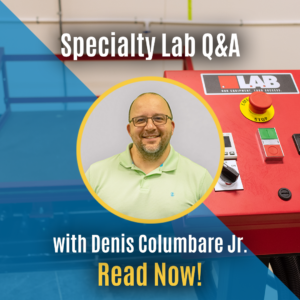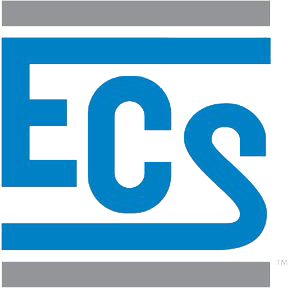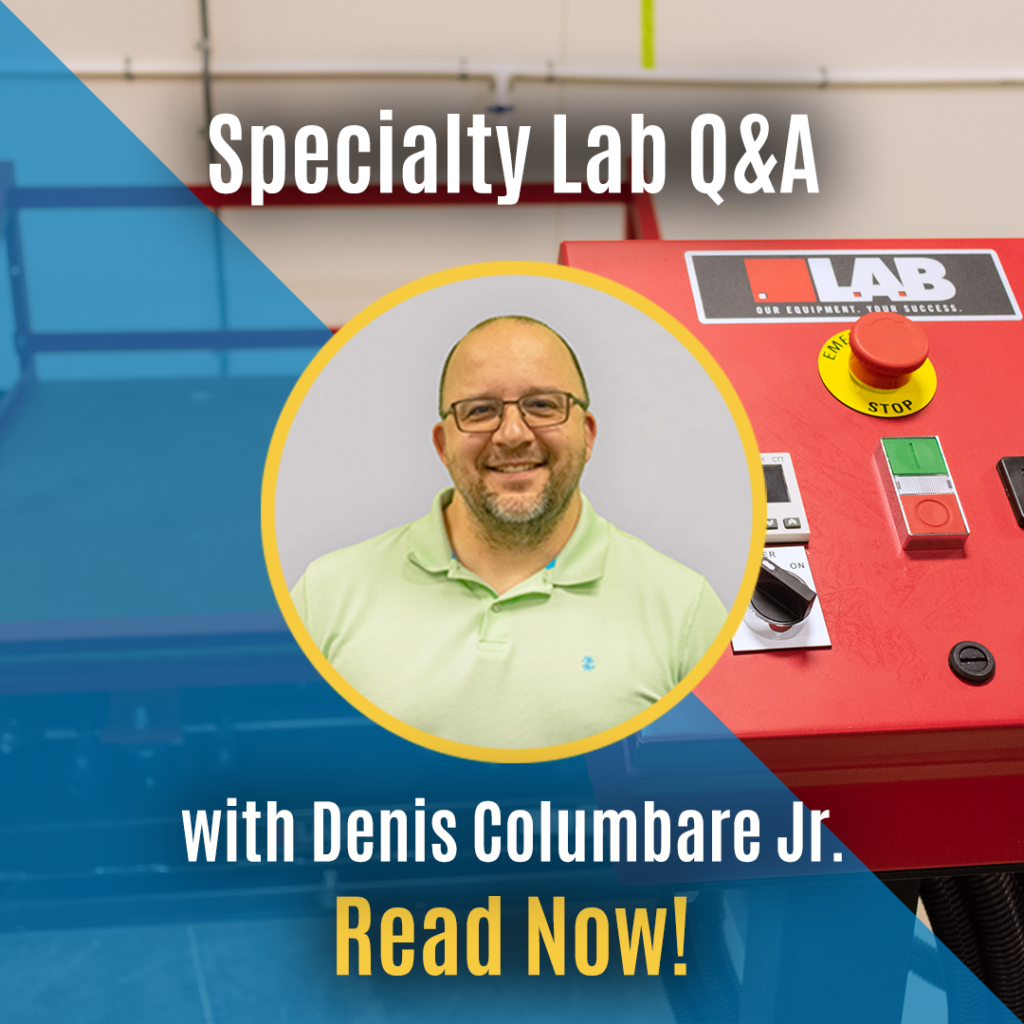
At ECS, we are constantly evolving and moving toward the future and new capabilities in our industry. We sat with Denis Columbare, our specialty testing lab manager under our facilities department, to learn more about him, his background in the industry, and the unique capabilities of the specialty testing lab located in our Pittsburgh, Pennsylvania office.
Q: What is your role with ECS and what unique capabilities have you brought to the company?
A: My role is multifaceted; I work with our Due Diligence group performing Property Condition Assessments (PCA), mainly because of my educational background in architecture. I am also the specialty testing lab manager for the company.
Q: What made you pursue a career in third-party lab testing?
A: I was a kitchen and bath designer for many years; one day, a client who trusted me saw similarities in my job and capabilities and asked me if I wanted to run their testing lab. They told me what it would entail, I thought it sounded interesting and I went in thinking there was nothing to lose. The rest is history; I have been doing testing ever since.
Q: Can you tell us about the Specialty Testing Lab and what types of tests you can currently perform?
A: We can perform heat or cold shock testing with any range of humidity on many things, ranging from building materials to consumer products. We are also able to perform vibration testing, which simulates shipping. In addition, performing drop testing, which tests the impact durability of a product; this test also relates to Department of Transportation (DOT) HAZMAT package testing. Lastly, I can perform internal or external applied pressure tests as well; these tests can be performed with water, inert compressed gas or even a vacuum chamber.
Q: What types of clients could you test products for?
A: The sky’s the limit. If a client needs to test building materials or consumer products for weatherization, drop tests for product durability and hazmat package transportation or various manufacturer research and development needs, we can almost always help. With this lab, we have a variety of markets that our services cater to.
Q: How does third-party testing relate to our other services?
A: Instead of working directly with our contractors, we work more closely with the companies who manufacture the materials for our contractors.
Q: What is the plan for the lab growth in the future?
A: In the future, we will be adding tension-compression testing, corrosion or salt fog testing, UV exposure testing and product life cycle testing to our list of services. Tension compression tests involve applying a tensile or compressive force to determine its strength. Corrosion or salt fog tests include a chamber to test the subject’s ability to corrosive environments. Lastly, the UV exposure testing machine allows me to test a multitude of materials and products that would be subjected to such environments for fading and degradation. Product testing would include the ability to perform life cycle testing of products we use daily, such as power tools, exercise equipment and a variety of other products or materials, to ensure they function properly to help manufacturers determine the limits of their products or materials.
Q: How long have you been in the third-party testing field?
A: I have been in this realm of work and testing for about 17 years. I love the work I do because it is forever changing and I get to learn something new almost every day. When I get the opportunity to be inventive, work with my hands and be creative, it solidifies my desire for me to want to stay working in this field.
Q: Why did you choose to bring third-party testing to ECS?
A: I have known several of the ECS Pittsburgh associates for years. When our Mid-Atlantic Director of Facilities, Rich Storbeck, mentioned that he wanted to start a specialty testing lab, they pitched the idea of bringing me on for the task. The opportunity was too great to turn down. It was perfect timing for me to transition into a new phase in my career.
Q: There are only a handful of third-party laboratories in the country; why should a client choose ECS for their testing needs?
A: In my experience, I pride myself on the consistent accuracy of my work and how promptly I can get reports back to the clients that need those results. Having been in this field for as long as I have, I have formed strong, healthy ongoing relationships with people who know and trust in my abilities. If given a chance with new clients, I hope they will see what others already know. I sincerely look forward to future opportunities to prove myself to clients and create more solid and long-standing relationships.
Q: One of ECS’ fundamental values is safety. In what ways does third-party testing prioritize safety and uphold this value?
A: Safety is important in our line of work, internally and externally. Internally, before we perform any test, we ensure proper PPE and block off areas as needed. Externally, knowing the limits of a product or material informs the client as to what limit is safe to use their product or material or if it is safe to use in the first place by pointing out any deficiencies after testing is finished. No one wants faulty products or materials, so performing quality assurance testing before use or distribution is essential.
Q: Why is ECS’ third-party testing lab referred to as the “Specialty Lab”?
A: Because of the capabilities and future of the lab, in my opinion, the number of tests we can perform is potentially limitless. We have many current capabilities and things coming in the future and calling it anything else would likely under-inform or alienate cliental as to what this lab can do for them. This also differentiates the specialty lab from the concrete and soils labs located in most ECS offices.
Click here to check out our specialty testing lab page!

